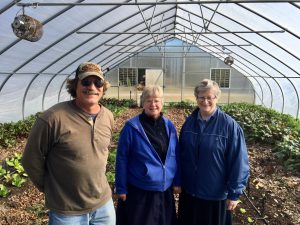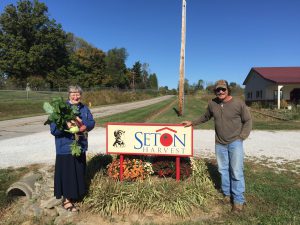 At about 7:30 in the morning, Daughter of Charity Sr. Maureen Houlihan drives over to Seton Harvest farm, pulls on a pair thick, rubber boots and carries feed over to her chickens. Technically, they aren’t her chickens — they belong to the community owned and operated Seton Harvest — but it’s a well-established fact that Houlihan and the chickens have a special bond.
At about 7:30 in the morning, Daughter of Charity Sr. Maureen Houlihan drives over to Seton Harvest farm, pulls on a pair thick, rubber boots and carries feed over to her chickens. Technically, they aren’t her chickens — they belong to the community owned and operated Seton Harvest — but it’s a well-established fact that Houlihan and the chickens have a special bond.
When the chickens see Houlihan coming, they begin cackling and crowding around the gate of their coop in anticipation. But when she actually sprinkles the feed, there’s instant silence.
“That shuts them up,” Houlihan says with a giggle. “At least for a little bit.”
The Daughters of Charity in Evansville, Indiana opened the nine and a half-acre Seton Harvest farm 10 years ago in an effort to provide fresh, pesticide-free food for the local community. People are invited to become shareholders in the farm, which allows them to come every week to pick up some of the 70 varieties of fruits and vegetables grown there throughout the year. Every year, the farm also donates about 12,000 pounds of produce to area food pantries and homeless shelters.
In the last decade, a number of communities of women religious have taken up the mantle of food justice — that is, a local community’s right to grow, sell and eat healthy food. Some, like the Daughters of Charity, have started natural farms or community gardens. Others have immersed themselves in agriculture policy on the local, state and federal levels.
Whatever the sisters are doing, it’s all in response to a changing food system they believe has stripped food sovereignty from the people. Rather, it’s now a handful of multinational food corporations that decide what foods are available in grocery stores.
“This might sound cliché, but people are disconnected from food and certainly from their food source,” Jennifer Tachney, co-director of Celeste’s Dream, said. “So just walking someone through the process of an annual cycle with food — from thinking about what you’re going to grow, to actually starting seeds, planting a garden, harvesting, sharing the harvest and then how to cook the food — this is a huge part of our education.”
 Even in Evansville, the rural area around Seton Harvest farm, knowledge about food and the food system is lacking. Houlihan recounts how a young girl came to the farm for a field trip and was stunned to see a potato
Even in Evansville, the rural area around Seton Harvest farm, knowledge about food and the food system is lacking. Houlihan recounts how a young girl came to the farm for a field trip and was stunned to see a potato
pulled up from the ground. Julie Dietz, the farm’s community outreach manager, shares the story of when she visited a school and a student declared she had never seen a carrot with its leafy green top.
The sisters’ goal is to educate and empower kids so they, in turn, can educate and empower their families in the quest for food sovereignty — regardless of their income.
“If you start young enough, you’re hoping that something gets in and stays with them,” said Sr. Theresa Peck, chair of the board for Seton Harvest. “Because in a lot of the poorer schools — and maybe the not so poor — they have no idea where food comes from, or about healthy eating or how a farm works. So it’s a huge education for the children and their parents.”
Excerpt taken from Global Sisters Report.
